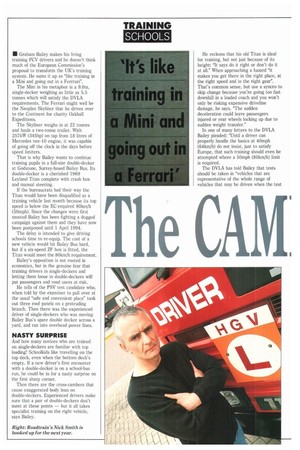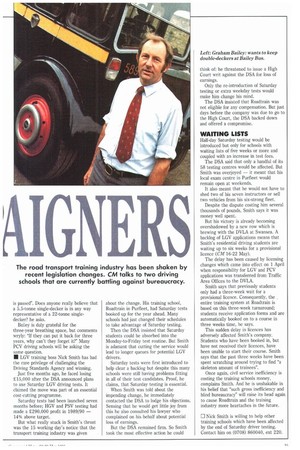e CA
Page 36

Page 37

If you've noticed an error in this article please click here to report it so we can fix it.
The road transport training industry has been shaken by recent legislation changes. CM talks to two driving schools that are currently battling against bureaucracy.
• Graham Bailey makes his living training PCV drivers and he doesn't think much of the European Commission's proposal to transform the UK's training system. He sums it up as "like training in a Mini and going out in a Ferrrari".
The Mini in his metaphor is a 9.0m, single-decker weighing as little as 5.5 tonnes which will satisfy the DVLA requirements. The Ferrari might well be the Neoplan Skyliner that he drives over to the Continent for charity Oakhall Expeditions.
The Skyliner weighs in at 22 tonnes and hauls a two-tonne trailer. With 257kW (345hp) on tap from 18 litres of Mercedes vee-10 engine, it was capable of going off the clock in the days before speed limiters.
That is why Bailey wants to continue training pupils in a full-size double-decker at Godstone, Surrey-based Bailey Bus. Its double-decker is a cherished 1969 Leyland Titan complete with crash box and manual steering.
If the bureaucrats had their way the Titan would have been disqualified as a training vehicle last month because its top speed is below the EC-required 80km/h (50mph). Since the changes were first mooted Bailey has been fighting a dogged campaign against them and they have now been postponed until 1 April 1994.
The delay is intended to give driving schools time to re-equip. The cost of a new vehicle would hit Bailey Bus hard, but if a six-speed ZF box is fitted, the Titan would meet the 80km/h requirement.
Bailey's opposition is not rooted in economics, but in the genuine fear that training drivers in single-deckers and letting them loose in double-deckers will put passengers and road users at risk.
He tells of the PSV test candidate who, when told by the examiner to pull over at the usual "safe and convenient place" took out three roof panels on a protruding branch. Then there was the experienced driver of single-deckers who was moving Bailey Bus's spare double decker across a yard, and ran into overhead power lines.
NASTY SURPRISE
And how many novices who are trained on single-deckers are familiar with top loading? Schoolkids like travelling on the top deck, even when the bottom deck's empty. If a new driver's first encounter with a double-decker is on a school-bus run, he could be in for a nasty surprise on the first sharp corner.
Then there are the cross-cambers that cause exaggerated body lean on double-deckers. Experienced drivers make sure that a pair of double-deckers don't meet at these points — but it all takes specialist training on the right vehicle, says Bailey. He reckons that his old Titan is ideal for training, but not just because of its height: "It says do it right or don't do it at all." When approaching a hazard "it makes you get there in the right place, at the right speed and in the right gear". That's common sense, but use a syncro to skip change because you're going too fast downhill in a loaded coach and you won't only be risking expensive driveline damage, he says. "The sudden deceleration could leave passengers injured or rear wheels locking up due to sudden weight transfer."
In one of many letters to the DVLA Bailey pleaded: Until a driver can properly handle the basics at 40mph (641cm/h) do not insist, just to satisfy Europe, that such training should even be attempted where a 50mph (80km/h) limit is required.
The DVLA has told Bailey that tests should be taken in "vehicles that are representative of the whole range of vehicles that may be driven when the test is passed". Does anyone really believe that a 5.5-tonne single-decker is in any way representative of a 22-tonne singledecker? he asks.
Bailey is duly grateful for the three-year breathing space, but comments wryly: "If they can put it back for three years, why can't they forget it?" Many PCV driving schools will be asking the same question.
LGV training boss Nick Smith has had the rare privilege of challenging the Driving Standards Agency and winning.
Just five months ago, he faced losing £.15,000 after the DSA announced plans to axe Saturday LGV driving tests. It claimed the move was part of an essential cost-cutting programme.
Saturday tests had been launched seven months before; HGV and PSV testing had made a £290,000 profit in 1989/90 — 14% above target.
But what really stuck in Smith's throat was the 15 working day's notice that the transport training industry was given about the change. His training school, Roadtrain in Purfleet, had Saturday tests booked up for the year ahead. Many schools had just changed their schedules to take advantage of Saturday testing.
Then the DSA insisted that Saturday students could be absorbed into the Monday-to-Friday test routine. But Smith is adamant that cutting the service would lead to longer queues for potential LGV drivers, Saturday tests were first introduced to help clear a backlog but despite this many schools were still having problems fitting in all of their test candidates. Proof, he claims, that Saturday testing is essential.
When Smith was told about the impending change, he immediately contacted the DSA to lodge his objections. Sensing that he would get little joy from this he also consulted his lawyer who complained on his behalf about potential loss of earnings.
But the DSA remained firm, So Smith took the most effective action he could think of: he threatened to issue a High Court writ against the DSA for loss of earnings.
Only the re-introduction of Saturday testing or extra weekday tests would make him change his mind.
The DSA insisted that Roadtrain was not eligible for any compensation. But just days before the company was due to go to the High Court, the DSA backed down and offered a compromise.
WAITING LISTS
Half-day Saturday testing would be introduced but only for schools with waiting lists of five weeks or more and coupled with an increase in test fees.
The DSA said that only a handful of its 58 testing centres would be affected. But Smith was overjoyed — it meant that his local exam centre in Purfleet would remain open at weekends.
It also meant that he would not have to shed two of his seven instructors or sell two vehicles from his six-strong fleet.
Despite the dispute costing him several thousands of pounds, Smith says it was money well spent.
But his victory is already becoming overshadowed by a new row which is brewing with the DVLA at Swansea. A backlog of LGV applications means that Smith's residential driving students are waiting up to six weeks for a provisional licence (CM 16-22 May).
The delay has been caused by licensing changes which came into effect on 1 April when responsibility for LGV and PCV applications was transferred from Traffic Area Offices to the DVLA.
Smith says that previously students only had a three-week wait for a provisional licence. Consequently, the , entire training system at Roadtrain is based on this three-week turnaround; students receive application forms and are automatically booked on to a course in three weeks time, he says.
This sudden delay in licences has adversely affected Smith's company. Students who have been booked in, but have not received their licences, have been unable to start their course. Smith says that the past three weeks have been spent scratching around trying to find "a skeleton amount of trainees".
Once again, civil service inefficiency is costing the training schools money, complains Smith. And he is unshakable in his belief that "such gross inefficiency and blind bureaucracy" will raise its head again to cause Roadtrain and the training industry more heartaches in the future.
El Nick Smith is willing to help other training schools which have been affected by the end of Saturday driver testing. Contact him on (0708) 860040, ext 220.








































































































